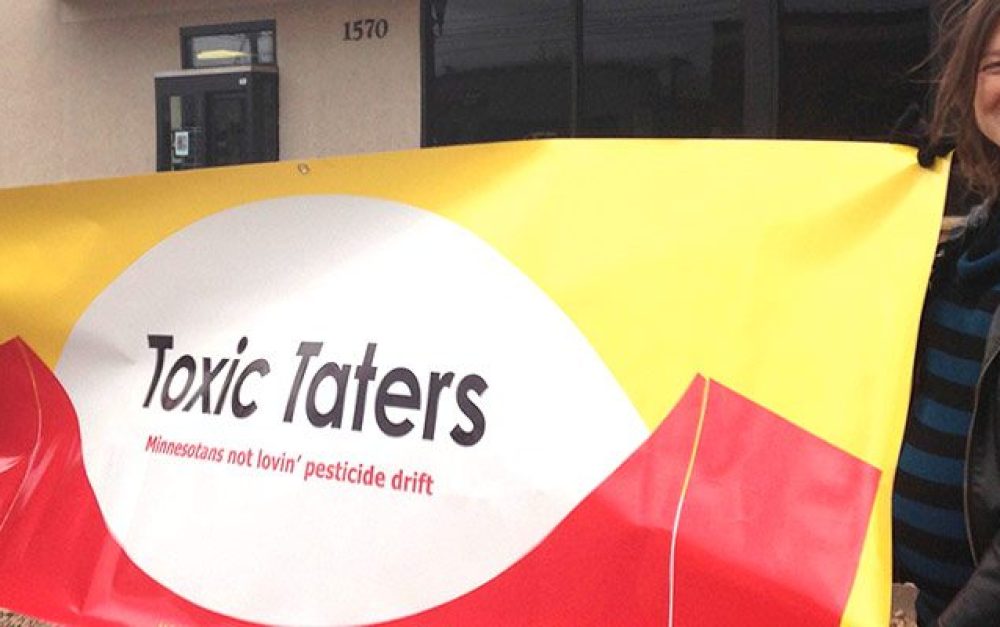It’s time for McDonald’s to make good on its promise to reduce pesticide use in potatoes produced for the company’s world famous fries. Support the Toxic Taters campaign, today!
A grassroots coalition of farmers, rural residents and White Earth tribal members has been working with PAN to document pesticide drift in the potato-producing regions of northern Minnesota since 2006.
After several years of working behind the scenes with state agencies and the region’s largest potato producer, R.D. Offutt (RDO), community members launched the Toxic Taters campaign in early 2014.
What we’re doing
The coalition is asking McDonald’s to require that its potato suppliers — like RDO — reduce their use of health-harming pesticides.
They’re also asking the fast food giant to require growers to release information on the chemicals they apply to their crops, and to adopt environmentally sound agricultural practices.
Since the campaign launch, Toxic Taters has conducted a speaking tour, delivered thousands of signatures to McDonald’s CEO, and organized statewide and national days of action with dozens of in-person events at local McDonald’s and hundreds of calls and emails to company headquarters.
Get involved!
The Toxic Taters campaign needs your support! You can help put pressure on McDonald’s to source non-toxic taters by:
- Following @ToxicTaters on social media, and reposting their messages targeting McDonald’s.
- Getting your own network involved! Start by tweeting these messages:
Rural communities near Minnesota potato fields are not lovin’ pesticide drift. Find out why: http://bit.ly/TTstory.
Dive in to the “dig deeper” sections below to learn more, watch and share the video featuring coalition members, and stay tuned for upcoming actions by signing up for PAN alerts. If your local group wants to get more involved, contact us to find out more about the campaign and how you can help!
Dig deeper
Learn more about the Toxic Taters campaign and McDonald’s pesticide problem.
Potatoes, RDO & McDonald’s
RDO has farming operations in 12 states, including Minnesota, North Dakota and Oregon. McDonald’s is the largest potato buyer in the United States, purchasing more than 3.4 billion pounds of potatoes every year.
The company could have a powerful, positive influence on potato-growing practices across the country.
McDonald’s responded to PAN’s Drift Catcher data in 2009 with a public promise to reduce pesticide use. The company did ask its potato producers to participate in a survey of integrated pest management (IPM), but has not shown any progress toward use reduction.
Instead, they launched an ad campaign promoting its potato growers’ practices.
Here’s Carol Ashley, a leader of the Toxic Taters Coalition and rural resident from Park Rapids, Minnesota:
It just doesn’t seem right that people can’t have safety from other people’s chemicals on their own property. We believe that growing food can be done in a way that doesn’t harm people or the environment.
The Toxic Taters coalition has seen little change on the ground in Minnesota. But the Minnesota Department of Agriculture has responded to their concerns by revising the Best Management Practices for fungicides in potato production, and the state’s Department of Natural Resources is requiring RDO to conduct an environmental assessment before expanding its Minnesota operations.
Rural communities harmed
Potato fields cover roughly 50,000 acres of Minnesota, and fungicides are applied to the vast majority of those potato acres — 98% in 2005. Using PAN’s Drift Catcher, communities in rural Minnesota have measured fungicides drifting into their homes, farms, schools and businesses.
These chemicals are linked to a variety of health harms. EPA says the fungicide chlorothalonil, for example, is “highly toxic” when inhaled, and a probable carcinogen. Pesticide drift has also harmed local livestock, threatening the livelihood of small farmers in the area.
Here’s Bob Shimek, a leader of the coalition, on the launch of the Toxic Taters campaign in 2014:
We’ve been to the legislature, to the Minnesota Department of Agriculture, to RDO, and very little has changed. We’re not lovin’ it. It’s time for McDonald’s to take responsibility for the communities negatively impacted by their business.
In the video below, Bob explains the troubling impacts of pesticide drift on the White Earth Indian Reservation, and other rural residents tell their stories. These community voices give us a more concrete understanding of what it means to face pesticides in the air, year after year.
Toward non-toxic taters
Organic potato acreage in the U.S. almost doubled between 2005 and 2011, according to USDA. In Europe, integrated pest management (IPM) techniques have decreased fungicide use on potato fields by more than 60%.
This encouraging progress can be partially explained by growing public concern about the negative impacts of chemically-intensive agriculture on human health and the environment.
Agroecological pest management includes practices that support vigorous crop growth while providing biological — rather than chemical — controls of pests and diseases. As PAN Senior Scientist Margaret Reeves explains in her GroundTruth blog, “Toward non-toxic ‘taters,” it’s a different way of thinking about pest control:
Fundamentally, the approach is one of prevention, resilience and control rather than eradication.
To help farmers move toward these agroecological approaches, we need to support public investment in organic farming. Farmers also need market demand for their sustainably produced potatoes — which is where convincing McDonald’s to buy non-toxic taters comes in.







